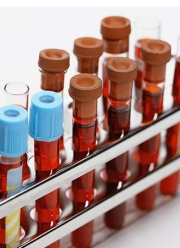Blood Tests During Pregnancy – What You Can Expect
 There are a number of tests which you may have done during the course of your pregnancy, and at times it may seem a little overwhelming, especially considering most of them have long and scary types of names.
So lets take a look at the blood tests you can expect to undergo, when they take place and what they are for.
There are a number of tests which you may have done during the course of your pregnancy, and at times it may seem a little overwhelming, especially considering most of them have long and scary types of names.
So lets take a look at the blood tests you can expect to undergo, when they take place and what they are for.
Initial Prenatal Vist Blood Tests
Most prenatal visits will involve the same tests and checks, including a measurement of your weight, recording of your blood pressure and urine testing. However during your first prenatal visit your healthcare provider will draw some blood for additional testing these tests may include:- Hemoglobin: This test is done to determine if you are anemic. Although some women become anemic during the course of their pregnancy it is important that low iron levels are treated correctly
- Blood type and RH with antibody screening: This test determines your blood RH type and antibody factor. If your blood type is RH negative and your partner’s is RH positive, special monitoring of the fetus is necessary to check for RH incompatibility
- Rubella titer: This test checks the level of antibodies to the German measles virus that are present in your blood. Should you become infected with German measles (rubella) during her pregnancy, her developing fetus may be at risk
- Syphilis screen: This test checks for the presence of syphilis infection. If the virus is found in your blood then it is important that your baby is treated
- Hepatitis B screen: As hepatitis B can be passed on to your baby so it is important to test for this virus
- HIV screen: This test checks for the AIDS virus. If the HIV infection returns a positive result, you can be treated during pregnancy which will reduce the chances of your passing the virus to your baby
- PAP smear: This test checks for abnormal cervical cells, which could indicate cervical cancer
- Gonorrhea and Chlamydia cultures:Both of these infections must be treated to prevent infection of the baby at birth
Subsequent Prenatal Visits
A blood pressure measurement is recorded at each visit. Sudden rises (hypertension) – or even drops (hypotension) in blood pressure can indicate complications during pregnancy. As you pregnancy develops there may be additional blood tests which are performed, although they are not always carried out.- Maternal Alpha-Fetoprotein (AFP) or expanded Alpha-fetoprotein testing which also includes measurements of estriol and HCG: Maternal Alpha-Fetoprotein is elevated in the blood of a mother who is carrying a baby with a neural tube defect in which the spinal cord does not close normally.As a result of this the The American College of Obstetricians and Gynecologists (ACOG) now recommends that neural tube screening be offered in the mid-trimester for women who get only first trimester screening for Down Syndrome. If the AFP is low and if the other tests are low and high, respectively, then an increased risk of Down’s syndrome is present
- Diabetes screening: Usually between weeks 14 and 28 a glucose tolerance test is performed. You will be given a sugary drink and then your blood sugar is measured to check for gestational diabetes. If gestational diabetes is present, then steps will need to be taken to keep your blood sugar levels normal. More on diabetes during pregnancy.
- Hemoglobin: Most healthcare providers recommend a repeat screening to check you again for evidence of anemia between the 26th and 28th week of pregnancy
- Group B streptococcus swab: This test involves a culture of the lower vagina to check for the presence of strep B infection. It is usually performed toward the end of pregnancy between the 32nd and 36th week. If the infection is present, you can be treated during labor to prevent infection of the baby during the birthing process
Common Blood Tests



